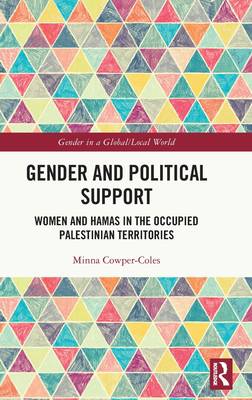
- Retrait gratuit dans votre magasin Club
- 7.000.000 titres dans notre catalogue
- Payer en toute sécurité
- Toujours un magasin près de chez vous
- Retrait gratuit dans votre magasin Club
- 7.000.000 titres dans notre catalogue
- Payer en toute sécurité
- Toujours un magasin près de chez vous
Gender and Political Support
Women and Hamas in the Occupied Palestinian Territories
Minna Cowper-ColesDescription
This book finds and explores a gender gap in political support in the Occupied Palestinian Territories whereby more women than men support Hamas, and more men than women support Fatah.
The author then shows how economic interests and religion largely explain this gender gap, and explores how the Israeli occupation, the Israel-Palestine conflict, women's rights, nationalism, and political repression impact Palestinian political support. She demonstrates how religion interacts with nationalist discourses, which in turn reinforce differential gender roles in Palestine. She also shows how patronage impacts political support in a gendered way, with Fatah's ability to provide employment opportunities being strongly linked to their support base amongst men. The book concludes with an analysis of similar trends in the wider Middle East, with women across the region tending to prefer religious parties, compared with men.
While making an important contribution to studies of Palestinian politics, this book also has implications for much broader issues, such as explorations of gender and political support beyond the Western context and understanding widespread female support for Islamist parties in the Middle East. It highlights the importance of situating explorations of political support within their wider context so as to understand how particularities of ideologies, economies and social structures might interact in a specific political system.
This book will be of great interest to students and scholars of gender studies, Middle East studies, and comparative politics. It will also appeal to those with a broader interest in Middle East politics and development.
Spécifications
Parties prenantes
- Auteur(s) :
- Editeur:
Contenu
- Nombre de pages :
- 236
- Langue:
- Anglais
- Collection :
Caractéristiques
- EAN:
- 9781032011448
- Date de parution :
- 05-08-22
- Format:
- Livre relié
- Format numérique:
- Genaaid
- Dimensions :
- 156 mm x 234 mm
- Poids :
- 530 g







